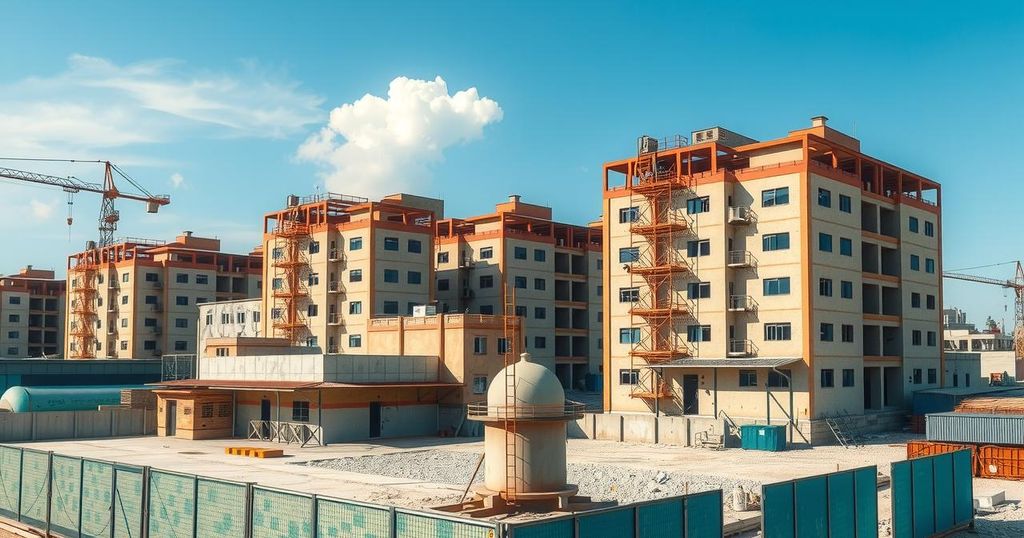North Korea to Send Thousands of Workers to Russia for Drone Production

North Korea is sending around 25,000 workers to Russia to assist in the production and operational training of Shahed drones at the Alabuga factory. This collaboration underscores increased military cooperation between the two nations amid ongoing conflict in Ukraine. Satellite imagery indicates preparations for more personnel at the factory, while Ukraine faces mounting threats from these drones.
North Korea is reportedly sending a significant number of workers—about 25,000—to Russia to assist in the production of Shahed drones. These workers will not only help in the manufacturing of the drones but also receive training on their operation. This development suggests an escalating partnership between North Korea and Russia, particularly in military capabilities, as discussed in an exclusive interview with Lt. Gen. Kyrylo Budanov, head of Ukraine’s Defense Intelligence Directorate.
“These moves will affect the security situation on two continents,” Budanov stated. According to him, Kim Jong Un could leverage these drones to enhance assaults on South Korea, potentially overwhelming the nation’s air defenses. Furthermore, this influx of North Korean workers, particularly in light of personnel gaps resulting from the ongoing conflict in Ukraine, could provide a relevant boost to Russia’s drone capabilities.
About 25,000 North Koreans are set to work at the Shahed factory located in the Alabuga Special Economic Zone in Tatarstan, as reported by Japanese outlet NHK. This collaboration is said to involve North Korea receiving training in operating unmanned aerial vehicles (UAVs) in return for its labor contributions in drone production. The factory, which reportedly produces approximately 2,000 drones monthly, has ambitious plans to increase this number to 5,000.
Recent satellite imagery shared on Ukrainian channels indicates significant expansion at the Alabuga factory, likely to accommodate the incoming North Korean labor force. Updates suggest that new dormitories are under construction, providing shared accommodation facilities for workers.
“A typical housing scheme for foreign workers in the Alabuga industrial agglomeration consists of two-story dormitories,” reported the Ukrainian outlet Militarnyi. Each building could house around 256 people, indicating thorough preparations for the growing workforce. Furthermore, there are indications that the Russian forces are not slowing down production, as many Shahed drones have become central to their military strategy.
The devastation wreaked by Shahed drones in Ukraine has made the Alabuga factory a major target for Ukrainian forces, with a recent attack occurring on June 15. Reports indicate that Ukrainian Special Operations Forces successfully struck critical elements of the Russian military-industrial complex using specially adapted drones. This method might allow for hitting multiple targets simultaneously, raising eyebrows in the defense community.
Additionally, alongside drone assistance, North Korea will contribute thousands of workers for reconstruction in the war-torn Kursk region. Following a diplomatic trip to Pyongyang, Russian Security Council Secretary Sergey Shoigu announced that around 1,000 sappers and 5,000 additional construction workers would be dispatched for rebuilding efforts.
The situation in Kursk remains precarious, with ongoing conflicts stemming from a surprise attack by Ukraine in August 2024. While Russia has regained most lost territory, the region has experienced extensive destruction.
In a past interview, Budanov outlined the relationship dynamics, noting that North Korea is also collaborating with Russia on UAV technology. He highlighted agreements that could shift the military equilibrium in the region, particularly affecting North and South Korea.
“There is a high probability that people among this labor migrant will start to sign contracts with the Ministry of Defense of Russia,” Budanov assessed. This movement could further integrate North Korean personnel into Russia’s military framework.
Reports also indicated that Russia has been instrumental in enhancing the precision of North Korea’s KN-23 ballistic missiles. Such cooperation could have significant implications for regional security moving forward, especially with Russian President Vladimir Putin showcasing little interest in de-escalating the ongoing conflict in Ukraine.
In summary, North Korea’s decision to send a large contingent of workers to aid in drone production marks a new chapter in military cooperation between North Korea and Russia. This partnership not only serves to strengthen Russia’s arsenal but also impacts security dynamics across Asia and Europe. As Ukraine faces mounting threats from advanced Shahed drones, the implications of this alliance could heighten tensions in an already volatile region, posing challenges for Ukrainian defense efforts.
Original Source: www.twz.com








